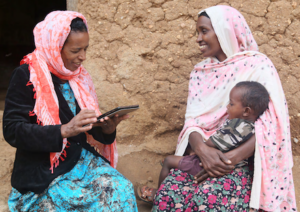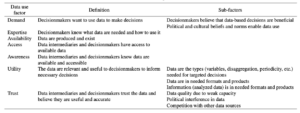Beyond Data Provision and Access – Facilitating Data Use to Enhance Climate Resilience Policies and Action and Advance Climate Adaptation Knowledge Brokering Approaches

The enhanced use of big data is an uncontested pillar of a more climate-resilient and sustainable future in the 21st century.
While technological advancements in digital data generation have created a vast landscape of opportunity, policymakers as well as professionals and organizations that work in climate adaptation and disaster risk management still struggle to harness the potential that lies in this valuable and partly ‘unmined’ resource (Lloyd, 2020). Therefore, PlanAdapt, as a knowledge brokering organization in the climate adaptation and climate risk management space, partners with other organizations, such as the Open Geospatial Consortium (OGC), that are focused on bridging existing gaps between technology and policymaking promoting highly optimized spatial data infrastructures and climate resilience information systems (Cassola et al., 2022).
Something that has often been neglected is the fact that data sets and systems need to be ‘ready’ for analysis and decision-making. This is what the concepts of ‘analysis-ready data (ARD)’ and ‘decision-ready indicators (DRI)’ embrace. It means that (geospatial) data providers will make a large amount of geospatial data available, for instance in time-sensitive climate-related disaster response situations. However, to make these datasets useful and decision-ready, they need to be able to be accessed, processed, analyzed, visualized, and communicated to responders and decision-makers in a very short amount of time.
Hence, data sets and the related technology solutions need to develop specific capabilities. The OGC Disaster Pilot 2021 has, for instance, tested a number of prototype capabilities to demonstrate what can be offered to support disaster response. These capabilities represent a proposed solution that does not have a single technology approach, but is focused on standards. Using standards can support data sharing and aim at making data findable, accessible, interoperable and reusable across any platforms.
The following capabilities have been identified being critical in view of user readiness:
Discovery & Registration Capabilities — critical starting point of the solution, providing the tools and solutions to help users find disaster-relevant information when a disaster occurs, to ensure that such data is put at the top of web search engine results.
Data Platforms Capabilities — cloud-based solutions that can be scalable when a disaster occurs to support the exploitation of Earth Observation and other data in relation to the disaster.
Analysis Ready Data & Analytical Processing Capabilities — taking raw data and turning it into ARD through processing, which can be shared with others using a standard output format which can then be integrated or displayed within a GIS.
Human Observations & Volunteered Geo Information Capabilities — ARD from real-time human observations to demonstrate how this can add value to the DRI recipe development.
Decision Ready Indicators Capabilities — recipes for DRI and using ARDs to develop example output DRIs to demonstrate how they would support decision making in a disaster. This includes using standards-based formats for transferring geospatial information.
Visualization & Communication Capabilities — online tools to support both the visualization of ARD and DRI, enabling users involved in the disaster response to collaborate, share information and allow field responders to take the information into the field without needing an internet connection. This aims to ensure that everyone working on the disaster has the right information at the right time.
These processes require intermediaries or knowledge brokers who translate data for policymakers and act as caretakers of knowledge sharing processes (Winters et al., 2022). Knowledge brokers can act not only as data translators but also as initiators of stakeholder engagement processes (Poirrier, 2018), bringing together a variety of actors who operate in this vast data ecosystem landscape either from the data supply or from the demand side, fostering direct communication without the need for an intermediary and generating new spaces for collaboration essentially breaking away from the traditional standpoint on supply-demand driven models and rather focusing on co-creation (Pringle et al., 2021).
Enhancing the data ecosystem is the approach taken by the 50×2030 Data Initiative, which seeks to increase the capacity of 50 low and lower middle-income countries to produce, analyze, interpret, and apply data to decisions in the agricultural sector.
A key aspect of this perspective is to move beyond a supply and demand framework, which does not capture the range of different actors in the data ecosystem nor their nuanced roles. This may require thinking beyond a “pipeline model” which sees evidence going from researchers to policymakers, to a greater understanding of policy processes more generally and where evidence is used in this process.
The initiative assesses data use within a country’s data ecosystem, defined as the community of actors, stakeholders, and entities who engage with data, the data assets (data sets, data products, platforms, tools, technologies) with which they interact, and the rules, norms, and structures that govern those interactions (policies, cultures, organizational structures, etc.). The assessment aims to identify enabling or constraining factors for data use within the ecosystem, guided by a data use conceptual framework (see table). This framework helps to understand, examine, prioritize, and address factors that enable data use, or inversely, constraint data use.

In the context of climate resilience, methodological approaches such as the 50*2030 data use conceptual framework capture the position of knowledge brokers within national data ecosystems and their role in promoting communication and knowledge-sharing between researchers and decision-makers to facilitate data use throughout the data cycle. What Winters et al. (2021) indicate by employing this framework is the need for knowledge brokers particularly in contexts where data collection is at an early stage, due to lack of analysis capacity within and outside of national and local governments.
PlanAdapt consistently improves its approaches to data use facilitation. The following projects and initiatives have provided further insights:
